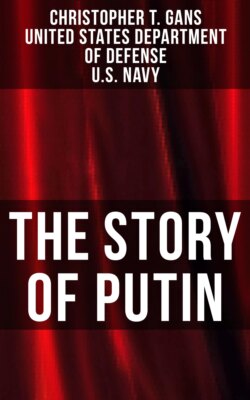Читать книгу The Story of Putin - United States Department of Defense - Страница 5
На сайте Литреса книга снята с продажи.
B. IMPORTANCE
ОглавлениеTable of Contents
A roller-coaster metaphor could easily be used to describe ongoing Russian-American relations on the global scene. Since the disintegration of the Soviet Union, relations between the surviving superpower, the United States, and the dominant Soviet successor state, the Russian Federation, have fluctuated wildly between open friendship, cold-war like intransigence, and anything in between. Anti-American rhetoric and policy actions have emanated from the Kremlin for decades, but hostile words and quarrelsome policies cannot force the United States into a standoffish position toward Russia. Under the leadership of Vladimir Putin, Russia’s continued vital importance on the geostrategic scene need only be demonstrated by its actions. Such actions include Putin’s baptism of fire in the Chechen Caucasus crisis upon ascending to the presidency in 1999, a revitalized Russian economic might hinged on mineral resources, an invasion of Georgia in 2008, their bilateral relations with several of the most potentially de-stabilizing regimes like those in Syria and Iran, and their permanent leverage within the United Nations Security Council. America must interact with Russia one way or another in this ever-shrinking world. Understanding the nature and impetuses of Russian/Putinist anti-Americanism could go a long way in aiding American policy-makers’ perception of just why Putin and Russia do what they do.
As the USSR dissolved, Boris Yeltsin took the reins of the Russian Federation, the largest country on the globe, and the most powerful of the post-Soviet successor states. Many in the West harbored dreams that Russia would transform into a democracy on the Western model and adopt foreign policies compatible with the current Western democratic states. When Putin came to the forefront in 1999, many hoped he, too, would continue down a path toward liberalization; it was not to be. Putin has steered the Russian political system’s development closer toward an authoritarian model, but not a total one; Russia has become what many in the broader literature refer to as a “hybrid,” or “electoral authoritarian,” or “competitive authoritarian” regime.1 Since the spread of Western democracy stagnated beyond former Soviet Eastern Europe in the 1990s, hybrid regimes that combine aspects of authoritarianism and institutional democracy have become ever-more commonplace as a result of what some call a “democratic rollback.”2
Putin must operate in a hybrid authoritarian political system in which actors within the state maintain degrees of political leverage over their government and leader. An understanding of such a system, therefore, shall be necessary to gauge any domestic political implications and potential benefits of Putin’s anti-Americanism. By better understanding Putin’s political situation within his state and the potential political benefits accrued by Putin for anti-American rhetoric and policy, Western entities might be better able to interact with Putin rather than discounting his actions as only the whims of a Russian strong-man.
1 Nikolai Petrov, Masha Lipman, and Henry Hale, “Overmanaged Democracy in Russia: Governance Implications of Hybrid Regimes,” Carnegie Papers, no 106 (February 2010): 1; Grigorii Golosov, “The Regional Roots of Electoral Authoritarianism in Russia,” Europe-Asia Studies 63, no. 4 (June 2011): 623; Timothy Colton and Henry Hale, “The Putin Vote: Presidential Electorates in a Hybrid Regime,” Slavic Review 68, no. 3 (Fall 2009): 503.
2 Larry Diamond, “The Democratic Rollback: The Resurgence of the Predatory State,” in Essential Readings in Comparative Politics, 3rd ed., eds Patrick O’Neil and Ronald Rogowski (New York: W. W. Norton and Company, 2010), 235.
